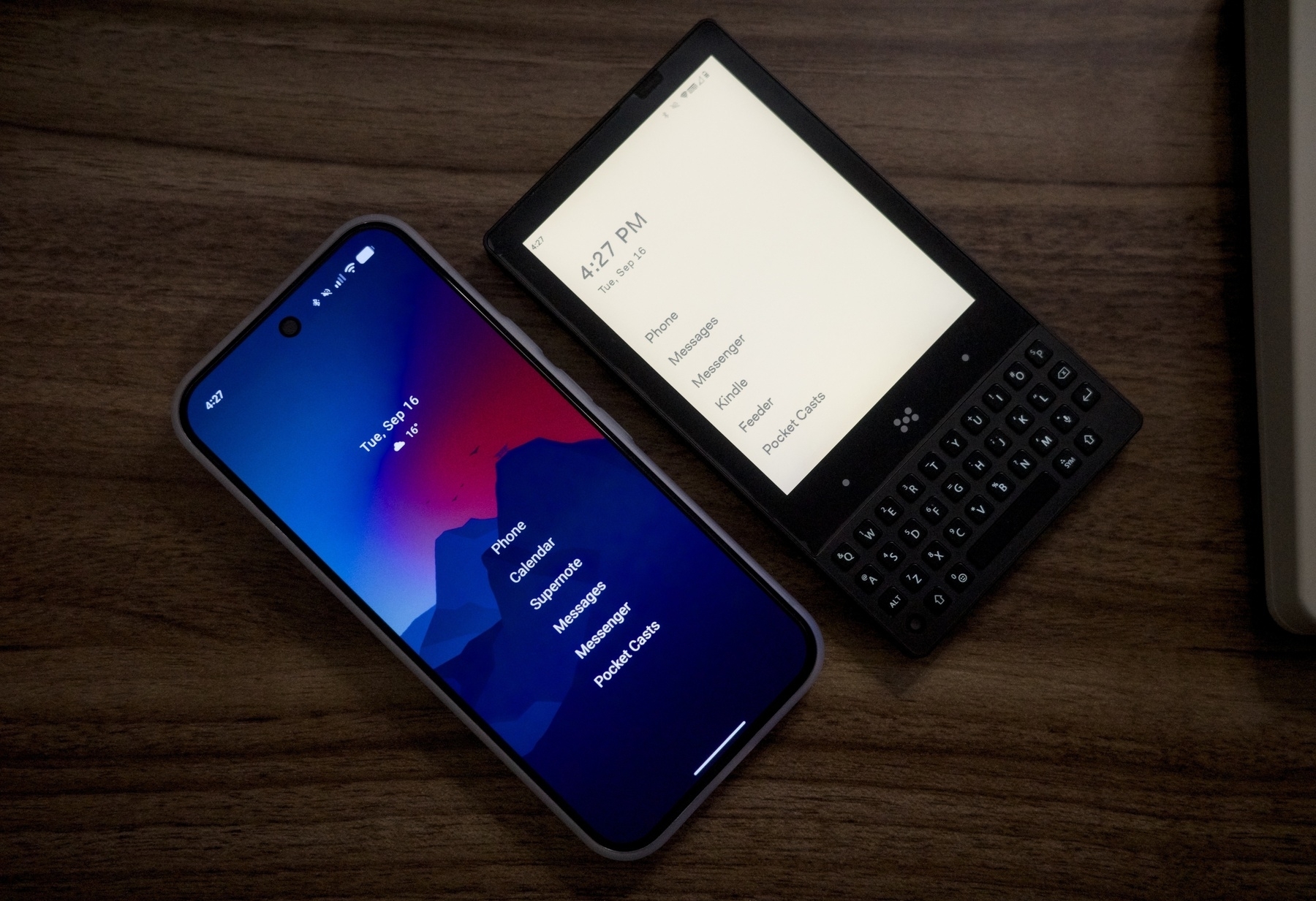My current state of digital intentionalism

Over many years, I’ve been on a journey of curating my online experiences to suit my needs at the time; with a particular focus on my smartphone usage.
In the past year, I’ve focused less on social media usage as I’ve long removed access to such services on my phone; limiting usage to the laptop. As such, I’ve been more focused on how I want to use my mobile devices; specifically in terms of reading and a communication device.
This has led me (back) to the world of physical keyboard devices. First with the Clicks keyboard for my Pixel, then to the ePaper based Minimal Phone.
For a while, I’ve been keen to see the progress of the Minimal Phone in the belief that an ePaper phone with a physical keyboard was my preferred setup for a phone moving forward. However, for various reasons the Minimal Phone was not up to the task at the time of my first write-up.
Recently there has been a new software update that (for me) has addressed many (but not all) of the issues that have prevented me from trusting it as my main device. For the most part, it now works close enough to what I think it is capable of for my needs.
However, there’s been a few events recently that have reminded me that my needs from a phone can change even temporarily. In such scenarios, such a device with physical limitations is too restricting.
The main event for me was last night needing to take my son to the emergency department in the middle of the night (nothing serious and he is fine). In the middle of getting things ready at 12:30am, I couldn’t bring myself to trust just taking the Minimal Phone with my main SIM card in it; and ended up taking both it and my Pixel 9 as a backup.
This was for two reasons. First was simply the fact that this is very much still a phone in development, and as such trusting it to simply make calls without having an issue is something that can’t be done yet. The second reason however is simple functionality; if I needed to quickly look up something or access a medical app, the Minimal Phone’s slow nature and ePaper screen would quickly become more of an inconvenience in a situation where I would want as minimal complications as possible.
Could it be done on the Minimal Phone or any other ePaper based device? Absolutely. Do I want to deal with that in any situation where urgency is paramount? Absolutely not.
There’s also scenarios where I want the ability to do more complex tasks on the phone. Sometimes I do want to photo edit and share through my blog via the phone, other times I may want to temporarily install a social app for work or personal purposes.
Because of this, I’ve got to admit to myself that an ePaper based phone is not something that is a viable phone choice for me. So what’s next?
Back to normal phones?
Right now my current state is back to pretty standard smartphones, that can adjust to my needs at any given time. However this does leave a gap that I haven’t been able to address with regular phones: reading.
I’m not a natural or massive reader, but I’ve enjoyed picking up the habit over the past few years through devices like the Kindle. While technically it is more than possible to read books on a regular smartphone, the reality is my eyes quickly tire from an LCD or OLED display compared to any ePaper device.
One of the things I’ve loved about the Minimal Phone is the ability to read at any time. Instead of scrolling through a feed or checking work stuff, I could fill those small moments of time by reading a book. Even last night, as we were waiting on the doctor in a busy emergency department, I was able to read a chapter or two of a current book. I’m just not encouraged to do that on a regular phone screen.
I’m probably at a stage where I need to drop the idea of reading books on the go and keep that to a dedicated reading device such as my Kindle. Annoyingly this means I will read less, but i just don’t believe ePaper phones are suitable for the rest of my needs.
Is it slightly annoying to end up back to almost where I started? A little bit. However as I’ve mentioned before, this is a constant journey. It’s not that I’m going back to bad habits of the past, I’m learning and tailoring my usage to suit my needs at the time.
Mindset

I’ve been unwell the past week and a bit. Combined with increasing frustration at work and this damn flu going through the household; I haven’t been in the most positive of moods.
But I’m able to sit here on a fresh but lovely spring day. Sunshine hitting my skin is rejuvenating, while a slight breeze ensures the sun is not overpowering. Delicious coffee from a local cafe, all reminding me how lucky I have it.
I’ve been too focused on the negative. I don’t need to ignore the things that aren’t working, pretending that they don’t exist; I need to ensure those don’t become my primary view and consume me.
Wary that this choice of mindset is an absolute position of privilege. The world is an increasingly scary place for many just trying to exist. My ultimate hope for the world remains: that people don’t need to have courage to live authentically.
It certainly feels like we are drifting further away from that. In the midst of this, it is very easy to lose sight of hope.
I have very little impact on this world. What I do have an impact on is which version of myself I bring to those in my life. If the version I bring to my loved ones is one of increasing frustration at minor life inconveniences; how can I be disappointed when they mimic this mindset?
I recently heard an interview with National Geographic Photographer Dewitt Jones, and the mindset he is known for which is to celebrate what’s right in the world. It’s not an ignorance of difficulty or injustice, but a discipline to focus on the good. To build up a reservoir of hope to call on when challenges need to be tackled.
My current hope is to learn and build this discipline.